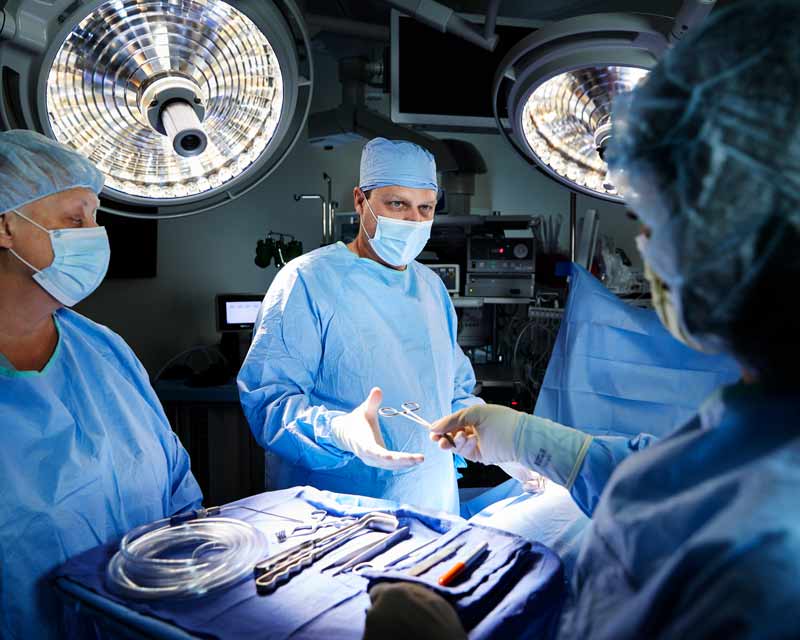
Comprehensive Esophageal Health Center opens with more convenient, streamlined care
 The biggest impact the Hereditary Colorectal Cancer Syndrome Clinic can make for patients is giving them the right diagnosis, says Matthew Kalady, MD, director of the Division of Colon and Rectal Surgery at The Ohio State University Wexner Medical Center and medical director of the Clinical Cancer Genetics Program at The Ohio State University Comprehensive Cancer Center – Arthur G. James Cancer Hospital and Richard J. Solove Research Institute (OSUCCC – James).
The biggest impact the Hereditary Colorectal Cancer Syndrome Clinic can make for patients is giving them the right diagnosis, says Matthew Kalady, MD, director of the Division of Colon and Rectal Surgery at The Ohio State University Wexner Medical Center and medical director of the Clinical Cancer Genetics Program at The Ohio State University Comprehensive Cancer Center – Arthur G. James Cancer Hospital and Richard J. Solove Research Institute (OSUCCC – James).
“When we do the right screenings, we can prevent cancer before it happens or catch it early and save a life,” Dr. Kalady says. “Then we can identify other people in the family before they would even think to get screened.”
The ability to intervene at an early age makes it possible to fully prevent some hereditary colorectal cancers.
This drive to diagnose, identify, intervene and prevent inherited colorectal cancers fuels the clinic’s growth. Dr. Kalady hopes to open the clinic for an additional day each week and plans to add more specialists who will be available for same-day appointments.
The clinic takes a multidisciplinary approach to patient care. As a colorectal surgeon, Dr. Kalady helps with diagnosis, screenings and treatment. Other specialists on the team include gastroenterologists, genetic counselors, gynecologists, oncologists, urologists and endocrinologists.
Right now, Dr. Kalady shares clinic time and space with Pete Stanich, MD, a gastroenterologist who oversees the endoscopic screenings. A genetic counselor also works closely with them in the clinic, providing counseling, diagnosis and management as a team, on the same day. Patients often need additional appointments to see other physicians on their care team.
“There are lots of different physicians and other caregivers who need to be involved,” Dr. Kalady says. “It truly is a team effort, and we need the right coordination of care to make it easy and effective for patients.”
When a patient is diagnosed with a hereditary cancer, “we encourage them to have their family members tested also,” Dr. Kalady says. A person’s first-degree relatives — parents, siblings and children — have a 50% chance of also having the condition. All should get genetic testing and counseling.
About 25% of all colorectal cancers carry some familial component, and 5% arise within a hereditary syndrome, being caused by an inherited genetic variant.
Different gene variants are responsible for different syndromes, which each have varying cancer risks. Some gene variants result in a 100% chance of developing colorectal cancer, while others are less likely, but still much higher than the general population. People are also at increased risk of developing other types of cancers too, depending on the gene variant.
In general, people with a hereditary syndrome have an increased risk of developing colorectal polyps and cancers at a higher rate and at a younger age than the general population. With familial adenomatous polyposis, people may develop polyps as early as 10 years old.
If physicians know a person is at risk, they can recommend early screenings. These hereditary colorectal cancer syndromes can impact the colon and rectum or be extracolonic and affect the stomach, small bowel, uterus, ovaries, pancreas, thyroid and skin.
“There is an opportunity in the medical community to learn more and increase recognition of these conditions,” Dr. Kalady says. “Having a dedicated team of people who understand and recognize these conditions and know how to manage them makes a huge difference in patient outcomes and quality of life.”
There are two main hereditary colorectal cancer syndromes that are seen most in the clinic. Both conditions will almost certainly result in colorectal cancer without intervention.
Lynch syndrome: This is the most common hereditary colorectal cancer syndrome. People with Lynch syndrome carry a mutation on one of four genes and are very likely to develop cancer of the colon, rectum, uterus, small bowel, stomach, urinary tract, pancreas or skin. Lynch syndrome accounts for 3% of colorectal cancer cases, and occurs in every 279 people in the general population. Early identification and intervention by screening and removing precancerous lesions save lives.
Familial adenomatous polyposis (FAP): This is the second most common hereditary colorectal cancer syndrome and impacts the colorectum, small bowel, stomach and thyroid. Patients can also develop tumors called desmoids. About 1% of all colorectal cancers arise within FAP. Patients with FAP begin screening for colorectal cancer between ages 10 and 12 and eventually will need to have their colon and rectum removed as prevention against colorectal cancer. Colorectal surgeons can create a new bowel reservoir and reconnect the gastrointestinal tract to maintain bowel continence and avoid a stoma.
Dr. Kalady strives to prevent cancer before it develops. His expertise in colorectal surgery and diagnosing hereditary colorectal syndromes helps patients and families at increased risk of developing colorectal or other cancers because of a particular family history or inherited condition.
Research is woven throughout Dr. Kalady’s work. The clinic maintains a database of all patients with hereditary colorectal cancer syndrome that tracks each patient’s specific diagnosis, genetic mutation, phenotype and treatment response.
“We don’t just look at a gene or syndrome but at specific mutations or the spot on a gene that causes different things to happen,” Dr. Kalady says. “This helps us take a more personalized approach to managing a person’s specific genetic variant.”
Research and findings from the Ohio Colorectal Cancer Prevention Initiative (OCCPI) informs the hereditary team’s ongoing work and patient care. Funded through money raised by Pelotonia, OCCPI is a statewide initiative to identify Lynch syndrome in patients with colorectal cancer.
The screening effort redirected how family members at risk of developing these cancers can take precautionary measures.
As new patients are diagnosed and undergo genetic testing, Dr. Kalady and colleagues search for genes or mutations “we didn’t know about that might be causing these syndromes,” Dr. Kalady says. “Being at a high-volume center gives us access to more information.”
Dr. Kalady is also a member of the Cancer Biology Program at the OSUCCC – James. His basic science research lab works to identify genetic pathways and proteins that help prevent the development of cancer or enhance its treatment.
The goal is to understand the underlying causes of why some patients and cancers respond better to certain treatments. Sample cells from precancerous colorectal polyps or cancers are grown in the lab and then tested with different drugs to see how they respond.
“We’re trying to figure out if there are certain drugs that slow the growth of these polyps or make chemoprevention more effective,” Dr. Kalady says, “with the idea of eventually personalizing care.”